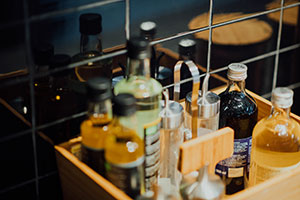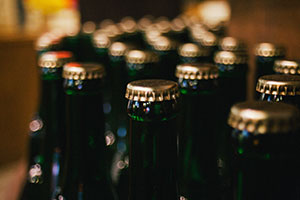Can You Change The Name On A Ttb Registered Beer
Label Laws for Florida Beverages

Labels on alcoholic beverage containers must comply with both U.S. and Florida laws and regulations.
The reason these laws exist is to ensure container labels accurately correspond the beverage inside. Beverage manufacturers must include specific data on the product labels. Florida manufacturers must as well comply with the Florida Alcohol Beverage and Tobacco'south (ABT) characterization registration process and, in some cases, the federal Tax and Trade Bureau's (TTB) label approving process.
Required Characterization Information
Full general information
The contents of a drink container, whether a bottle, can, growler, or keg, must be adequately described by the container label. The states law and Florida constabulary both require certain information to exist included on container labels. To comply with both laws, Florida drinkable labels must include the following:
- Make name
- Class (lager, ale, etc.)
- "Florida" or "FL" (required for malt beverage only)
- Manufacturer proper name and accost
- Net contents in ounces ("oz")
- Alcohol content ("alc/vol" or "alc by vol")
- Disclosure of any of the following:
- FD&C Yellow No. 5 (color condiment)
- Carmine (color condiment)
- Sulfites
- Aspartame
The surgeon general warning alcohol text
Don't forget to include the health warning.
Here is the exact text of the surgeon general warning for alcohol text:
GOVERNMENT Alarm: (one) Co-ordinate to the Surgeon General, women should not beverage alcoholic beverages during pregnancy because of the risk of birth defects. (2) Consumption of alcoholic beverages impairs your ability to drive a car or operate mechanism, and may cause wellness problems.
Note that additional requirements utilize when beverage container labels include additional linguistic communication. For example, federal law allows labels to include disclosures about major food allergens, i.e., wheat or nuts, but such disclosures must include all major food allergens used in production.
There are different rules for cider and depression-alcohol vino
Wine (including cider and perry) that contains less than 7% alcohol by volume (ABV) is subject to the labeling laws regulated past the US Nutrient & Drug Administration (FDA) rather than the TTB. Labels for these products are required to include information about ingredients, nutrient value, and allergens according to the FDA's Nutrient Labeling Guide.
Label Registration in Florida
Annals your Florida drink labels with the ABT
Florida police force requires that a beverage container characterization must exist registered with the ABT whenever the alcoholic beverage is sold or transported within the state. The ABT'due south online characterization registration system is fairly easy to navigate. This process requires information about the manufacturer, the brand name, and the location of the text "FL" or "Florida" on the label. Registration requires the manufacturer to upload the label or keg neckband paradigm. The paradigm tin either come from the TTB'south COLA organization (if the label is registered with the TTB) or it tin be uploaded direct to the ABT's label registration system.
Why is "FL" or "Florida" required to appear on every beer can, canteen, and keg?
This regulation has been required past laws since 1959 and was created to insure that all packaged beer destined for Florida complies with Florida law, including taxation drove.
Pay the fees
Registration isn't complete until the fee is paid!
Florida's almanac registration fee is $xxx for beer and distilled spirit labels and $15 for wine labels. Registration is not consummate until the registration fee is paid and a registration number is issued by the ABT.
Does every experimental or 1-off beer served in a Florida brewery taproom take a registered label?
Technically yes, but this might exist impractical. A brewery should ensure that all registered beers being distributed or regularly circulated in the taproom contain a registered characterization.
Unlike the TTB, the ABT does non actually approve the drink container labels registered on their organization. Unfortunately, just because a brewery completes their registration and receives a registration system, it does not confirm that the registered characterization actually complies with Florida constabulary.
Federal Characterization Approval for Vino and Spirits and for Beer Sold Out-of-State

For wine, spirits and beer destined for sale outside Florida, the container label must also exist approved through the TTB'due south Document of Label Approval (COLA) process. Earlier getting to the COLA process, yet, the TTB, requires formula approving in some cases.
Formula approval for non-traditional beverages
In some cases, before approving a production'due south characterization, the TTB requires blessing of the production itself. This is done through the TTB's formula approving process.
The TTB requires formal approving, nearly often, when a beverage contains adjuncts or other additives, such equally flavoring and coloring materials. Beverages made using traditional ingredients and processes are by and large exempt from formula approving. The TTB'south formula blessing tools (for beer and for wine and spirits) are handy quick-references for those beverage styles and situations that require pre-COLA formula approval.
The TTB's COLA Process
This process involves an online system, like to the TTB'south label registration system. The TTB offers a detailed FAQ, describing both common and unique situations. Labels for vino (including cider) containing less than 7% ABV does not require COLA approval.
How long does the formula and COLA processing take?
The TTB does not impose a fee for using formula blessing or characterization processing. However, approval is not immediate. Equally of September 15, 2019, formula approval processing fourth dimension is approximately 9 days if a sample is non rqeuired, and 23 days with a sample. Label approval processing time for wine is 10 days, for beer is 15 days, and for spirits is 29 days. Upwardly to date data is bachelor at Formula Approval Processing Time and COLA Processing Time.
Small changes are immune without new label approval
One time the TTB approves a drinkable label, the manufacturer can use the Commanded Changes Sample Characterization Generator to decide what modifications are allowed and exercise not require a new characterization blessing. Generally, a new label approval is required when a change is made to the class, type, or appellation of the label, or when label graphics or wording are added or changed (unless they are merely holiday themed).
Label approval is not trademark protection
Registering a beverage characterization with the ABT or obtaining TTB label approval provides no additional intellectual belongings protection. It is not a substitute for federal registration of a trade proper noun (for the manufacturing and brand names), trade wearing apparel (for the design of the container), or copyright (for the text and graphical design on the container).
Do y'all need assistance with characterization approval?
At BrewerLong, we take helped many clients go their labels canonical at the country and federal level. Contact us today with any questions y'all have or for help registering your beverages.
Because nosotros're attorneys: This blog mail service is provided on an "as is" and "as available" basis every bit of August 11, 2019. We disclaim any duty to update or right any information contained in this web log mail, including errors, even if we are notified about them. To the fullest extent permitted by police, we disclaim all representations or warranties of any kind, limited or implied with respect to the information contained in this blog post, including, merely not limited to, warranties of merchantability, fitness for a detail purpose, championship, non-infringement, accuracy, abyss, and timeliness. We will not exist liable for damages of any kind arising from or in connection with your use of or reliance on this web log post, including, just not limited to, direct, indirect, incidental, consequential, and punitive damages. Yous concord to use this weblog postal service at your own risk. Regarding your particular circumstances, nosotros recommend that you consult your own legal counsel–hopefully BrewerLong.
Can You Change The Name On A Ttb Registered Beer,
Source: https://brewerslaw.com/label-laws-for-florida-beverages/
Posted by: baughmanressuffe.blogspot.com


0 Response to "Can You Change The Name On A Ttb Registered Beer"
Post a Comment